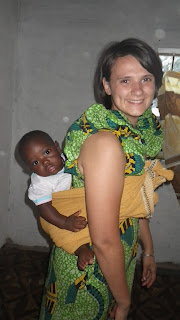I leave soon, next month kind of soon. Now that two years
have passed, I have moved out of my village and into the Peace Corps training
center to spend my last two months leading the pre-service training for new
batch of education volunteers.
Leaving Ngayen Sanjal was hard. I felt ravenous for every
detail during my final weeks. I savored moments writing by candlelight, the
call to prayer sounding from the mosque over the drumbeats of Nigerian pop
music at a wedding on the far side of the village. Moments sitting outside my
door after an evening run in the bush, watching my host sister chat while her
18 month old on her back leans around to see the bats awoken in the evening
twilight as they swoop past corners. Moments visiting a friend, lying on a mat as
chickens peck and squawk all around. My friend sits with her newborn, Ebrima,
lying beside her as she takes out a little girl’s braids with a stick. Lizards
round the tree. Vultures circle the sky. Her co-wife brews attaya, the smell of
burning sugar fills the air. We chat a little about work, the fields, the heat,
and my impending departure as she repeatedly pours the tea from one small cup
into another. But mostly, I just lay and listen while they chat about who’s
doing what in the village.
Then came my last week in Ngayen Sanjal, and it certainly
was memorable. It is no surprise that sometimes Peace Corps Volunteers get
sick. I have pooped my pants twice during my service. Once during training, and
the second time was that last week. I guess you could say I came full circle? The
week also saw the president pass by three times on his agricultural tour. When
the president travels, all the school children go to the road to welcome him,
along with most of people from the village. They put on their best outfits,
many of them wearing fabric with the president’s face on it, to stand and wave
as his hundred plus vehicle motorcade drives by. I stood at the road for three
hours in the morning waiting for him to pass in his white robes and dark
sunglasses. He passed by again in the evening and once more the next morning. Each
time the students went to greet him.
My last day there was busy visiting many families. The
father of my good friend had passed away the day before. I covered my head and
went to their compound to offer condolences. I also greeted the chief of
village and thanked him for his hospitality. I went to the compounds of my
closest friends in village and at their request, gave them pictures of me to
remember me by. I received parting gifts of photos, peanuts, and fabric. I
spent the night as I spent most nights, lying outside with my family, staring
up at the stars. Some of my friends over to drink attaya and listen to the
radio.
The next morning was emotional. Once the Peace Corps driver
arrived, my little sister began to wail. She didn’t cry; she wailed! Tears
escaped my own eyes as my head teacher, family, and friends came to pack the
car. People prayed for my wellbeing and safe travels and thanked me for the
work I’d done in the school. They asked me to greet all my family and friends
in America for them. I thanked them for their hospitality and for their
patience. Tears continued to flow as we drove away.
There is a Mandinka proverb that says no matter how long a
log lies in the river, it will never be a crocodile. For two years I lived in
this village, a member of a family, a part of the community. My biggest fear
when I started Peace Corps was that I wouldn’t be a part of the community, that
I’d remain on the edge without making genuine connections with people. Now as I
reflect, I see that this is not important. I can live as a Gambian as long as I
want, but I will still remain an American woman. But while I can’t say that I felt
completely integrated into the community, I still made genuine connections with
people I won’t forget. I played the role of teacher, student, mentor, friend,
and sister. Maybe the log will never be a crocodile, but that doesn’t mean that
relationships can’t be formed, experienced shared, and lives impacted. There
are people in Ngayen Sanjal who will forever remain in my heart. Below are a few of them.
I like to think that they feel the same way.
 |
| Aret, Hincha, Mam Tutti and Me |
 |
| Me, Kodu, Mam Tutti, and Hincha |
 |
| Musa and Me |
 |
| Pa Kebba and Me |

No comments:
Post a Comment